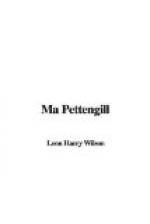I waited beside Ma Pettengill at the open door of the Arrowhead ranch house. It was a moment of tranquil expectancy; presently we would be summoned to the evening meal. Down by the barn a tired janizary pumped water into a trough for two tired mules still in harness. Halfway down the lane, before a mirror tacked to the wall beside the bunk-house door, two men hurriedly combed their damp hair. Blackbirds were still noisy in the poplars. In the field at our left a lazy lot of white-faced cattle, large and placid, lolled or grazed on the new spring grass.
Surveying these cattle with a fond eye—had she not that day refused all of three hundred and twenty-five dollars a head for a score of these pure-bred cows?—my hostess read me a brief lecture on the superior fleshing disposition of the Hereford. No better rustler under range conditions, said she, accumulating flesh at all ages, storing it in seasons of plenty to draw on in seasons of want. Hadn’t I noticed how common cows got paunchy and how well the fat was distributed on the pure-breds?
I had not noticed, cows being more or less cows to me, but I was prepared to look with deep respect upon any cow for which three hundred and twenty-five dollars could be sanely refused, and I now did so. I was told that I forgot their calves, which would be worth a hundred and sixty dollars the day they were weaned. This made it all more impressive. I looked respectfully again at the bulky creatures, though listening, too, for the stealthy-stepping Lew Wee; a day in the thin spring air along a rocky trout stream had made even cattle on the hoof suggestive.
Ma Pettengill, with a last proud look at her jewels, swept the panoramic camera of her eye round to the blacksmith shop on our right. Before it were strewn the mutilated remains of four wood wagons. I had lately heard the lady have words with Abner, the blacksmith, concerning repairs to these. Abner himself had few of the words. They were almost entirely his employer’s. They were acutely to the effect that these here wagons would be running again before the week was out or she would know the reason why. The aggrieved Abner had tried to suggest that this reason she would know would not be the right reason at all, because wasn’t he already working like a beaver? Possibly, said the lady. And beavers might be all right in their place. What she needed at this precise time was someone working like a blacksmith—someone!
Over her shoulder she had flung the word at him, blackened with emphasis.
“Any one hurt in the runaway?” I asked, observing her glance to linger upon this snarl of wagon parts.
“Four wagons was mortally hurt,” said the lady, “but of course not a mule skinner touched. Talk about charmed lives! Besides, they wasn’t accidents; they was just incidents. It was part of our winter sports.”
“I didn’t know you had winter sports up here.”




